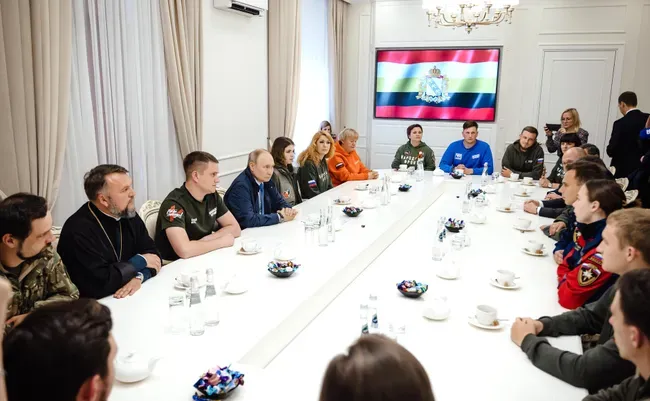0640GMT/Putin travels to Kursk; Hungary to leave ICC

PUTIN VISITS KURSK: Vladimir Putin on Tuesday evening made a surprise visit to the Kursk region, which was partially captured by Ukrainian soldiers, the Kremlin said on Wednesday. This was Putin's first visit to the region since March when he was filmed wearing military fatigues and giving orders to his military commanders.
(NOTE: Ukrainian forces captured part of the Kursk region in August but were slowly pushed out. By the end of April, in time for the Kremlin's May 9 Victory Day military parade, Russian forces had pushed Ukrainian forces out of the region.)
(COMMENT: Putin didn't visit the area captured by Ukrainian forces but, nonetheless, it was an important PR trip for him. The "civility" of the meeting on Tuesday was deliberately set up to contrast with the heavy military vibe of Putin's trip to the region in March. A video showed Putin wearing a tie and sitting around a table with "representatives of volunteer organisations", who looked faintly terrified. The Kremlin also said that Putin met up with Kursk governor Alexander Khinshtein, considered a rising star, and also toured a nuclear plant in the town of Kurchatov. This was close to fighting between Ukrainian and Russian forces and is symbolic because the Kremlin claimed that Ukrainian forces planned to capture the nuclear power stations.)
HUNGARY TO LEAVE THE ICC: Hungary's parliament on Tuesday approved a bill that will allow the country to withdraw from the International Criminal Court. (COMMENT: Hungary's withdrawal from the ICC is important to the Kremlin for two reasons. The ICC has an arrest warrant out for Vladimir Putin. By withdrawing from the ICC, Hungary is effectively picking Russia's side. It also, in theory at least, means that Putin can now travel to Hungary without being arrested. Hungary's PM Viktor Orban has been a critic of Western intervention in Ukraine since the start of the war, straining his ties with the EU. This month, Hungarian special forces have arrested several "Ukrainian spies" in Hungary.)
EU TO FUND RADIO LIBERTY: The EU has taken on the funding of Radio Liberty/Radio Free Europe in the South Caucasus and Central Asia, Kaja Kallas, the EU foreign policy chief, said on Tuesday. (COMMENT: Radio Liberty/Radio Free Europe is seen as an important influence tool of the West but had been facing an uncertain future under the Trump Administration which called it an "expensive Cold War relic" and withdrew funds. The 5.5 million euro funding for Radio Liberty/Radio Free Europe highlights how important the EU feels it is to counter Russian propaganda.)
SANCTIONS: The EU has approved a new round of sanctions against Russia which targets another 189 tankers in Russia's "shadow fleet". Media in the US has quoted Trump, instead, as saying that he won't go along with any more sanctions on Russia because he is committed to "negotiations". (COMMENT: This shows the hardening positions of both the EU and the US towards Russia.)
MIGRANT CRACKDOWN: Russia's top prosecutor, Alexander Bastrykin, said on Tuesday that "terrorist crimes" committed by migrants had increased by 270% in the first three months of the year. (COMMENT: It's difficult to know how seriously to take this sort of statement. This could be Bastrykin's way of explaining the continued clampdown on the rights of migrant workers from Central Asia. Russian security forces regularly perform "counter-terrorist" operations.)
MIGRANT SOLDIERS: Bastrykin also said that there were 20,000 naturalised Russian citizens now fighting in Ukraine for Russia. (NOTE: This is the first time that a Russian official has put a figure on the number of foreign nationals fighting for its army in Ukraine. These men will mainly be migrant workers from Central Asia. Migrants from Central Asia take Russian citizenship to ease the regulatory burden of working in Russia. Over the past couple of years, the Kremlin has been pressuring them to sign up to fight in Ukraine. Earlier this month, Ukrainian forces captured an Uzbek fighting for Russia.)
RUSSIA'S AMAZON EXPANDS: Wilberries, often dubbed "Russia's Amazon", has started selling products from the UAE. (COMMENT: Since the start of the war in Ukraine, Wildberries has become an important part of the Kremlin's wider strategy for maintaining an air of commercial normality in Russia and expanding Russian markets into new regions -- especially China, Central Asia, the South Caucasus and the Middle East. It is also a reminder that the UAE is cosy with Russia despite also maintaining good relations with the West.)
RETAIL DEAL: Magnit, the Russian retail chain, on Tuesday finalised a deal to buy an 81.55% stake in Azbuka Vkusa, the upmarket high street supermarket with 177 stores in and around Moscow and St Petersburg. Analysts have estimated the cost of the deal at around 35-40 billion roubles ($500 million). (COMMENT: Magnit has said that it wanted to buy Azbuka Vkusa for the various synergies that the two retailers can combine. Magnit is especially interested in Azbuka Vkusa's higher-value customers. Azbuka Vkusa's former co-owner, Kirill Yakubovsky, was sent to prison for eight years in April for fraud.)
